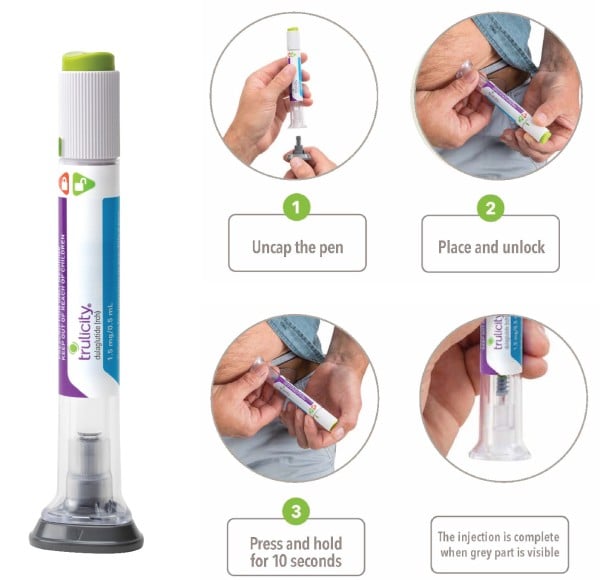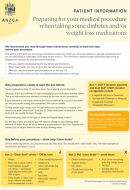You can now add Healthify as a preferred source on Google. Click here to see us when you search Google.
Dulaglutide
Sounds like ‘due-lah-gloo-tide’
Key points about dulaglutide
- Dulaglutide is used to treat type 2 diabetes.
- Dulaglutide is also called Trulicity.
- Find out how to take it safely and possible side effects.

Dulaglutide is used to treat type 2 diabetes and to protect you from having a heart attack or stroke. Dulaglutide may also protect your kidneys and may help you to live longer. Read more about type 2 diabetes.
Dulaglutide lowers your blood glucose in several ways, including by helping your pancreas produce more insulin after meals, slowing down food absorption and reducing your appetite. This is one reason why people on dulaglutide usually lose weight.
Dulaglutide can be used alone or with other diabetes medicines (eg, metformin, insulin, glipizide or gliclazide), along with healthy eating and regular exercise. Dulaglutide is available as an injection given under your skin.
Dulaglutide is NOT the same as insulin
Although dulaglutide is an injection, it is not insulin.
- Dulaglutide helps your body to release its own insulin just when you need it, improving blood glucose control throughout the week.
- Unlike insulin it won't cause weight gain or low blood glucose levels (hypoglycaemia) when it's used alone.
- Unlike insulin, which requires 1 or more daily injections, you only need to have a dulaglutide injection once a week.
Dulaglutide is given as an injection
- Dulaglutide comes as a ready-to-use injection pen containing 1 dose (1.5 mg).
- It's pre-filled with the medicine and the needle is already fitted onto the pen.
- The injection is given under the skin of your thigh or tummy (abdomen/puku).
- It comes as a single-use pen, which means that each pen is used only once for one injection.
- The pen is very easy to use – you don't need to measure or mix anything, or see, fit or handle a needle.

Image credit: Dulaglutide pen and injection technique images courtesy of Eli Lilly and Company (NZ) Limited. Reproduced with permission.
Inject dulaglutide ONCE A WEEK
Dulaglutide is injected once a week, on the same day each week.
- It can be injected any time of day, with or without meals.
- You can mark your calendar or set a reminder on your phone to remind you to take your next dose.
- You can also change the day of the week on which you take dulaglutide if necessary, as long as it has been at least 3 days since your last dose of dulaglutide.
If you forget your dose of dulaglutide: If you forget your dose, you can inject the missed dose up to 3 days later. Otherwise skip the dose and carry on as normal next week. Don't inject 2 doses around the same time.
Change (rotate) your injection site each week
- Inject dulaglutide under the skin on your thigh or on your abdomen (belly) at least 5 cm from your belly button.
- If the injection is given by someone else, it may be injected into your upper arm.
- Change (rotate) your injection site each week.
- You may use the same area of your body, but be sure to choose a different injection site in that area.
- Don't inject into skin that's sore, bruised, red, hard or scarred or skin that has stretch marks or psoriasis plaques.
Here are some things to know when you're using dulaglutide. Other things may be important as well, so ask your healthcare provider what you should know about.
Drink enough water to avoid dehydration
When you start dulaglutide, it can cause nausea (feeling sick), vomiting (being sick) and diarrhoea (runny poo), that can last for a few days. This increases your risk of dehydration, which can cause serious kidney problems. Be sure to drink plenty of water or non-sugary drinks. Contact your healthcare provider if you have nausea, vomiting and diarrhoea or get symptoms of dehydration such as headache, feeling lightheaded or dizzy, weakness, feeling very tired, having no energy and peeing (urinating) less than usual.
If you are unwell
Dulaglutide doesn't usually cause problems if you're slightly unwell, but if you're dehydrated from vomiting and diarrhoea and not eating and drinking as usual, you can delay the next injection until you're better. Talk to your healthcare provider if you have any questions.
Taking other medicines
Dulaglutide interacts with some medicines, herbal supplements and rongoā Māori, so check with your healthcare provider before starting dulaglutide and before starting any medicines, vitamins or supplements that you buy without a prescription from your pharmacy, supermarket or health food shop.
Before having surgery or a medical procedure
Dulaglutide can slow down the emptying of your stomach and may increase the chance of food or liquid getting into your lungs during surgery or other procedures that use anaesthesia or deep sleepiness (deep sedation). Tell your healthcare provider you're taking dulaglutide before you have surgery or a medical or dental procedure. Read more about preparing for your medical procedure when taking some diabetes and/or weight loss medicines.(external link)
Store dulaglutide pens in the fridge, in the original package
Do not freeze. If your pen has been frozen, don't use it. If you don't have a fridge (eg, when you're on holiday), you can keep your pen at room temperature (less than 30°C) for up to 14 days.
Note, dulaglutide can be injected cold, but it may sting. It's best to take your dulaglutide pen out of the fridge and leave it at room temperature for 15–30 minutes before injecting. Don't warm dulaglutide in any other way, eg, in the microwave or hot water.
Get rid of your used injection pens safely
It's important to get rid of your used injection pens safely. Keep them out of reach of children and pets, and places where they could hurt others. You can buy a sharps container from your pharmacy. This is a special container made of hard plastic that has a tight-fitting lid so used needles and syringes can be stored securely. Don't flush used needles and syringes down the toilet or put them in household or public rubbish or recycle bins. Once your sharps container is full, take it to your pharmacy for safe disposal.
Like all medicines, dulaglutide can cause side effects, although not everyone gets them. If you're concerned about any symptoms you think might be related to your medicine, talk to your healthcare provider. The following information offers some guidance but doesn't include all possible side effects.
Common side effects
Tell your healthcare provider if they bother you.
- Nausea (feeling sick). This is quite common with dulaglutide especially 2 to 3 days after the injection and then gets better. Eat smaller meals and more slowly. Avoid eating 2 hours before bed and avoid fried or fatty foods and alcohol. If you are vomiting or dehydrated, delay your next dose until you feel better and are eating and drinking normally.
- Stinging, pain, redness or bruising at the injection site. Remember to change the injection site every week. You can use the same part of your body but try not to use exactly the same spot. Avoid injecting dulaglutide cold, because it's more likely to sting.
- Diarrhoea (runny poo), constipation, tummy pain, reduced appetite. If you have diarrhoea or are dehydrated, delay your next dose until you feel better and are eating and drinking normally.
Tell your healthcare provider immediately or phone Healthline free on 0800 611 116 if these occur
- Signs of dehydration such as headache, feeling lightheaded or dizzy, weakness, feeling very tired, no energy and peeing (urinating) less than usual.
- Signs of an inflamed pancreas (pancreatitis) such as severe pain in your stomach and back.
Phone 111 for an ambulance or go to your nearest accident and emergency (A&E) clinic if these occur
- Signs of an allergic reaction such as itchy skin, and rash, swollen lips or tongue, problems breathing, like a tight chest or shortness of breath.
Read more about medicines and side effects and reporting a reaction you think might be a side effect.
References
- Dulaglutide(external link) NZ Formulary
- GLP1 receptor agonists(external link) Ministry of Health and NZSSD, NZ
- Glucagon-like peptide-1 receptor agonists: stay hydrated(external link) Medsafe Prescriber Update, NZ, June 2025
Brochures

Preparing for your medical procedure when taking some diabetes and/or weight loss medications
Australian and New Zealand College of Anaesthetists

Medicines and side effects
Healthify He Puna Waiora, NZ, 2024

Health Quality and Safety Commission, NZ, 2019 English, te reo Māori
Credits: Sandra Ponen, Pharmacist, Healthify He Puna Waiora. Healthify is brought to you by Health Navigator Charitable Trust.
Reviewed by: Angela Lambie, Pharmacist, Auckland
Last reviewed:
Page last updated:





